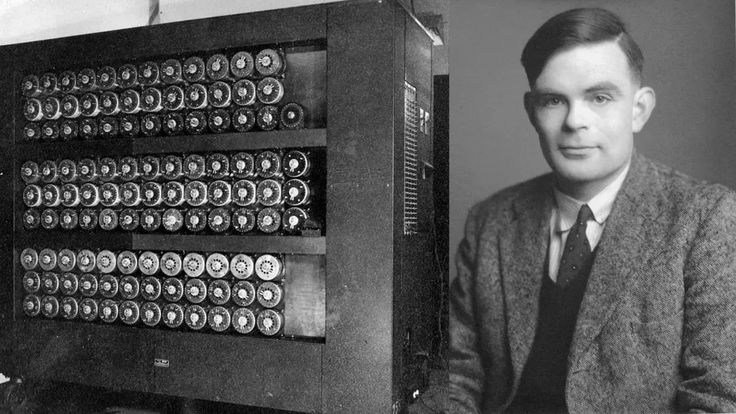“The Innovators Who Shaped the Digital World: A History of Computer Founders”
In the realm of technological innovation, few fields have seen as rapid and impactful growth as computing. The journey from rudimentary mechanical devices to the powerful digital systems we use today is a testament to the vision and determination of the pioneers who laid the groundwork. This blog post will take you on a captivating journey through the history of computer founders, their groundbreaking contributions, and the evolution of computing technology.
The Early Days: Setting the Stage for Innovation 
The story of computers begins long before the modern era, with early inventors who laid the foundational concepts. One of the earliest known devices was the abacus, used for basic arithmetic operations. However, the true leap toward computing began in the 19th century.
Charles Babbage and the Analytical Engine
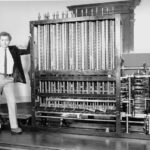
Charles Babbage, often hailed as the “father of the computer,” conceptualized the Analytical Engine in the 1830s. This mechanical general-purpose computer was designed to perform any calculation, using punched cards to input data and instructions. Though never completed in his lifetime, Babbage’s vision laid the groundwork for future developments.
Ada Lovelace: The First Computer Programmer
 Working closely with Babbage, Ada Lovelace wrote detailed notes on the Analytical Engine, including an algorithm intended to be processed by the machine. Her work is considered the first instance of computer programming, and she is celebrated as the first computer programmer.
Working closely with Babbage, Ada Lovelace wrote detailed notes on the Analytical Engine, including an algorithm intended to be processed by the machine. Her work is considered the first instance of computer programming, and she is celebrated as the first computer programmer.
The Evolution of Computers: From Mechanical to Digital
The early 20th century saw significant advancements in computing technology, transitioning from mechanical systems to electronic ones.
Alan Turing and the Turing Machine 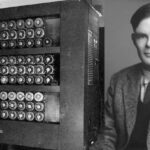
Alan Turing, a British mathematician, introduced the concept of the Turing Machine in 1936. This abstract machine could simulate the logic of any computer algorithm, providing a theoretical framework for digital computing. Turing’s ideas were instrumental during World War II, leading to the development of the Bombe, an electromechanical device used to decipher the Enigma code.
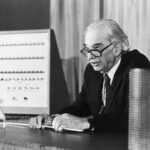 John Atanasoff and the ABC
John Atanasoff and the ABC
In the late 1930s, John Atanasoff, along with his student Clifford Berry, developed the Atanasoff-Berry Computer (ABC). This was the first electronic digital computer, utilizing binary representation and electronic switches. Although it was not programmable, the ABC marked a significant step toward modern computing.
The Birth of Modern Computing: Post-War Developments
The end of World War II marked the beginning of a new era in computing, characterized by rapid advancements and the birth of modern computers.
ENIAC: The First General-Purpose Electronic Computer 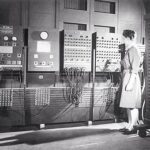
The Electronic Numerical Integrator and Computer (ENIAC), developed by John Presper Eckert and John Mauchly at the University of Pennsylvania, was the first general-purpose electronic digital computer. Completed in 1945, ENIAC could perform a wide range of calculations much faster than previous machines, setting the stage for future developments.
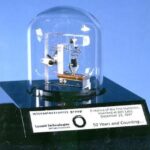 The Invention of the Transistor
The Invention of the Transistor
In 1947, William Shockley, John Bardeen, and Walter Brattain at Bell Labs invented the transistor, a small semiconductor device that could amplify or switch electronic signals. This invention revolutionized electronics and paved the way for the development of smaller, more powerful computers.
The Rise of Personal Computing: The 1970s and 1980s
The 1970s and 1980s saw the emergence of personal computers, bringing computing power to homes and small businesses.
Steve Jobs and Steve Wozniak: Apple Inc.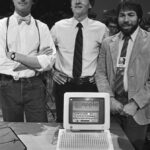
In 1976, Steve Jobs and Steve Wozniak founded Apple Inc. and introduced the Apple I, a single-board computer that revolutionized the industry. The subsequent release of the Apple II in 1977, with its user-friendly interface and software ecosystem, cemented Apple’s place in computing history.
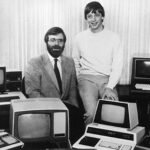 Bill Gates and Paul Allen: Microsoft
Bill Gates and Paul Allen: Microsoft
In 1975, Bill Gates and Paul Allen founded Microsoft with the vision of a computer on every desk and in every home. Their MS-DOS operating system became the foundation for IBM PCs, and the introduction of Windows in 1985 popularized graphical user interfaces, shaping the future of personal computing.
A Look at Diverse Programming Languages:
- Grace Hopper: Known for developing the first compiler for a computer programming language. She also conceptualized the idea of machine-independent programming languages, leading to the development of COBOL (Common Business-Oriented Language).
- John McCarthy: Created Lisp (List Processing), one of the earliest high-level programming languages and still in use today in artificial intelligence research.
- Dennis Ritchie and Ken Thompson: Developed the C programming language at Bell Labs in 1972, which has been highly influential and remains widely used.
- Guido van Rossum: Created Python in the late 1980s, emphasizing readability and simplicity, which has become one of the most popular programming languages worldwide.
- James Gosling: Created Java in the mid-1990s, designed for platform independence and widely used for building web applications and software.
The Pioneers of Computer Software: Innovators Who Changed the Digital World
The history of computer software is a captivating tale of innovation and ingenuity. Software, the lifeblood of modern computing, powers everything from personal computers to complex systems controlling critical infrastructure.
The Early Innovators: Laying the Foundations
The journey of computer software began with the pioneering efforts of early innovators who conceptualized and developed the first software programs.
Ada Lovelace: The First Computer Programmer
Who is considered the first computer programmer?
Ada Lovelace is regarded as the first computer programmer for her work on Charles Babbage’s Analytical Engine, where she developed the first algorithm intended for processing by a machine.
What was the first electronic digital computer?
The Atanasoff-Berry Computer (ABC), developed by John Atanasoff and Clifford Berry in the late 1930s, is considered the first electronic digital computer.
How did the invention of the transistor impact computing?
The transistor, invented in 1947, allowed for the development of smaller, more efficient, and more reliable computers, leading to the rapid advancement of electronic devices and the miniaturization of computing technology.
What role did Alan Turing play in the development of computers?
Alan Turing’s theoretical work on the Turing Machine provided a foundation for the concepts of algorithms and computation, significantly influencing the development of modern digital computers.
Conclusion

